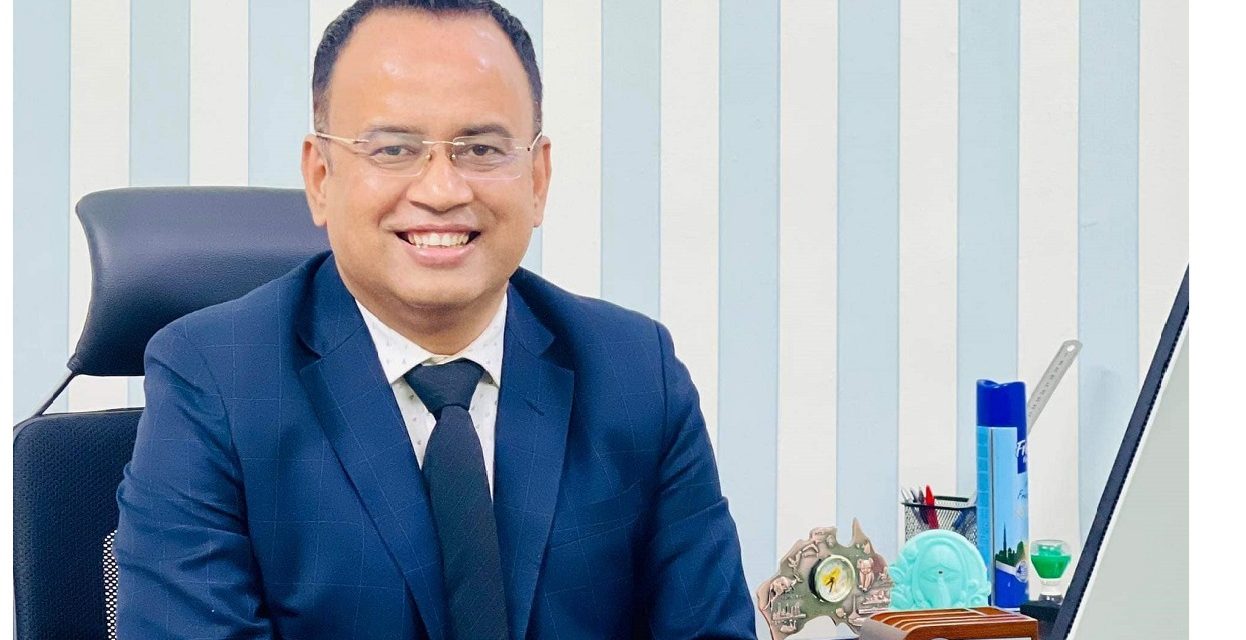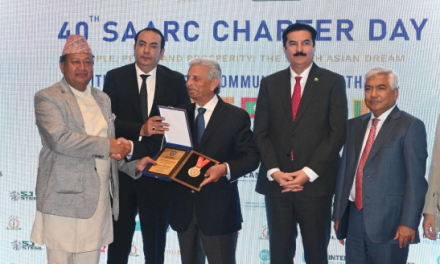-Seshraj Bhattarai
Kathmandu- In 2025, the world is changing quickly, and countries like Nepal face increasing challenges. U.S. President Donald Trump is back in office, attacking globalization and stepping away from the liberal international order that once empowered smaller nations like Nepal. The Trump administration has reinstated high tariffs and continues to challenge the global system that the United States played a central role in establishing after World War II. Europe, once a key and reliable partner, is now frequently sidelined. The U.S. tariff policy under Trump appears increasingly unpredictable, driven more by political objectives than by sound economic rationale.
Many global institutions and liberal frameworks are being left behind. The world is slowly shifting away from principles of fairness and international rules, and moving toward a system where power, speed, and influence carry more weight. A transactional, interest-driven approach to global affairs is becoming the new norm. Within the White House, traditional political advisors appear to have less influence than before. Elon Musk—once a tech entrepreneur, now a close confidant of Trump—apparently hold more influence than any official advisor.
In this vantage point, the global landscape has become more complex and competitive, with influence no longer concentrated solely in the hands of a few major powers like the United States and China. Today, regional powers, multinational corporations, economic coalitions, and technology giants all play increasingly significant roles in shaping global affairs. In this dynamic environment, Nepal cannot afford to remain passive. It is crucial for Nepal to engage proactively—adapting to shifting trade dynamics, addressing the rise of protectionism, and fostering strategic partnerships that support and advance its national interests. This approach will ensure Nepal’s active presence and relevance in the global arena.
Today, Nepal’s presence on the international stage has become less prominent. Our foreign policy direction remains unclear, shaped by domestic political changes and the shifting expectations of our global partners. This lack of clarity stands out in our important relationship with India. Prime Minister KP Sharma Oli, once seen as a strong nationalist, now faces challenges in uniting political efforts at home. His planned official visit to New Delhi has not yet taken place, raising concerns that current diplomatic efforts are too focused on this single aim. Such a limited approach could weaken the broader vision needed for successful diplomacy.
India, for its part, is skeptical of Oli’s left-leaning coalition and views it as unstable. There is little trust from New Delhi toward his leadership. Under Prime Minister Narendra Modi and Foreign Minister S. Jaishankar, India has adopted a bold and pragmatic foreign policy—one that is calculated, assertive, and focused on strategic expansion. Diplomacy in New Delhi today is not just about goodwill—it is about influence, business, and leverage.
In this setting, Nepal-India relations have become more transactional than warm. A 45-minute meeting between Oli and Modi during the 6th BIMSTEC Summit in Bangkok earlier this April was celebrated by the Oli government as a success, but it was largely symbolic. Foreign Minister Arzu Rana Deuba has made repeated visits to New Delhi in an effort to finalize the Prime Minister’s itinerary—efforts that seem just as much political as diplomatic. They are meant to reassure her husband, Sher Bahadur Deuba—an influential coalition leader and likely future prime minister—that India still supports their fragile government.
When domestic politics dictate foreign policy, Nepal loses its voice on the global stage. In today’s uncertain world, this is a risky weakness.
Despite challenges, 2025 brings a valuable opportunity for Nepal to redefine its global engagement. The unpredictable direction of President Trump’s foreign policy has disrupted the traditional global order, creating space for new and emerging powers to assert themselves. As global power steadily shifts toward Asia, China is moving with purpose—expanding its influence, shaping international discussions, and offering new models of cooperation.
At the same time, the United States is turning inward—tightening immigration policies, enforcing travel bans, and increasing deportations. These actions are discouraging global talent, weakening America’s image as an open and inclusive society. In contrast, China is positioning itself as a center for innovation, investment, and opportunity—welcoming global talent and projecting confidence.
Simultaneously, India is emerging as a confident and influential global player—expanding its diplomatic footprint, asserting its economic and strategic interests, and strengthening partnerships across the world. Nepal must closely observe this growing influence and adapt to the evolving geopolitical realities in the region. Understanding these shifts is essential for Nepal to position itself wisely and safeguard its long-term interests.
Geographically situated between two rising giants—India and China—Nepal has often viewed its location as a limitation. However, this perspective needs to change. Rather than perceiving its position as a challenge, Nepal should recognize it as a unique strategic advantage.
With bold vision and steady leadership, Nepal has the potential to become a vital bridge—not just between South Asia and East Asia, but also between competing global interests. Nepal can serve as a platform where cultures, economies, and ideas converge. By asserting a clear voice aligned with its evolving national aspirations, Nepal can establish a meaningful role that reflects its values, priorities, and ambition to act as a connector in an increasingly fragmented world.
Yet Nepal’s greatest strength lies not only in its geography—but in its people. Each year, over 100,000 Nepali students pursue education abroad, acquiring expertise in diplomacy, business, science, and technology. These individuals represent the future policymakers, innovators, and leaders of Nepal. Upon their return, they bring with them critical global perspectives and networks that can drive national progress.
Nepal’s global diaspora is another vital, yet often underutilized, asset. Nepal has always had a rich history of intellectual and professional talent. Over the years, many Nepali individuals have gained invaluable international experience across various fields—business, technology, diplomacy, and more. Now, it is time to tap into this vast global talent pool and bring them back home to contribute to the country’s growth.
In the past, King Mahendra recognized the importance of bringing Nepali aspirants abroad back to Nepal, encouraging them to share their knowledge and expertise for the betterment of the nation. This vision was rooted in the belief that the strength of a nation lies not just in its geography or natural resources, but in the potential of its people. Today, Nepal must embrace that same spirit by inviting and welcoming its skilled diaspora to return and actively participate in shaping the country’s future.
With a clear strategy in place, Nepal can create platforms for these professionals to reconnect with their homeland—leveraging their international expertise, networks, and global exposure. This is not just about symbolism; it is a strategic initiative to bring the best minds together to drive the country forward.
Kathmandu has the potential to become a respected platform for dialogue in a world that is increasingly divided. As a country known for its commitment to peace and balance, Nepal is well-positioned to play a bridging role between nations and global powers. To achieve this, however, our foreign policy must be guided by the long-term national interest, not by short-term political agendas or party rivalries. What Nepal needs is a clear national vision, driven by shared aspirations for the future.
Nepal should not be compelled to choose sides between major powers—whether India and China or the United States and China. Instead, Nepal must define its own path, based on its priorities and decisions that reflect independence and strategic thinking.
This includes building trust and cooperation with India through open communication, joint projects in trade, energy, and infrastructure, and the respectful resolution of longstanding concerns. With China, Nepal should engage constructively, welcoming development partnerships while carefully safeguarding its sovereignty and long-term independence. Support should be based on mutual benefit, avoiding any over-dependence.
On the global stage, Nepal must reclaim its voice, offering clear and principled positions on issues like climate change, sustainable development, digital innovation, peacekeeping, and fair international trade. Even smaller nations can make a significant impact when they approach these issues with honesty, purpose, and a clear sense of moral responsibility.
To realize this vision, Nepal must invest in its future by nurturing young diplomats, foreign policy experts, and strategic leaders who understand the global landscape and can represent the country with dignity and strength.
At home, unity is essential. Political leaders must rise above factional rivalries and present a cohesive foreign policy. The world will not pause for Nepal’s next election; a divided government sends a message of uncertainty, while a united front inspires confidence.
Nepal’s history—of principled non‑alignment, trusted peacekeeping contributions, and respected global advocacy—offers a blueprint. This heritage, combined with fresh leadership and a clear strategy, can restore Nepal’s standing.
This is not simply a challenge for Nepal; it is an invitation. Nepal is more than a land of mountains and temples—it is a nation of deep roots, vibrant talent, and unbreakable spirit. In 2025, Nepal must step forward with conviction, define its own path, and offer new ideas to an anxious world. The courage to do so already lies within its youth, its thinkers, its diaspora, and its diplomats. Now it must live in our political leadership as well.
Diplomatic courage is not a relic of the past—it is the call of the present. Nepal’s new generation stands ready. It is time for Nepal to rise.
(The author is the chairperson of the Educational Consultancy Association of Nepal (ECAN)).





